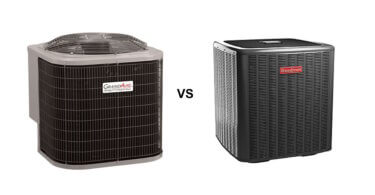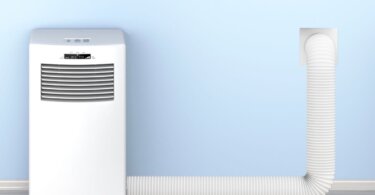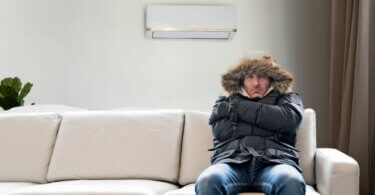The summer heat is upon us, and you know what that means? Cranking up the air conditioners across every home and office building.
However, with that comes a slew of hefty bills that most of us are unprepared to deal with. In that very spirit, this article’s going to answer the question of how to save money on air conditioning expenses. We will provide you with 12 energy-saving tips… Let’s hope we prove to be of some use!

1. Make Sure Your Thermostat Is Placed Correctly
For places with a thermostat, the reading is often the most accurate measuring tool for how cool a home is. Sometimes though, readings can prove to be faulty.
An example is when thermostats are placed on an exterior wall, or near windows, readings will be affected by the outer atmosphere and thus can be wrong. Thermostats can even be affected by the likes of lamps and other electronics being in the vicinity.
Luckily, the solution to this is simple: move your thermostat. Better place it in a central location of the house, away from heat-generating appliances, and you’re done!
2. Setting Up Your ACs Temperature Is Important
The US Department of Energy recommends an indoor temperature of 78°F. However, you can still be smarter about your ACs temperature settings. Keeping the thermostat raised by 10 degrees for 8 hours of the day can save over 10% of your yearly billing. Naturally, turning your air conditioning off for long stretches of absence is recommended as well.
3. Avoid Activities That Generate Heat
An easy way of reducing your air conditioning bill is by reducing its need in your home. You can easily bring down your indoor temperature with just micromanaging a few activities at home.
Cleaning dishes using a dishwasher? Maybe take turns around the house and do them by hand! Relying on a clothes dryer to deal with wet clothing? Hang them outside using a line!
Doing these things by hand instead of relying on machines reduces the need for a constantly blaring AC around the house. It will also help you to save up on your electricity bill in general.
4. Upgrade To Smart Thermostats For Efficient Management
Smart thermostats can regulate the temperature and cooling when you aren’t home. Many of them can be set to a pre-determined temperature that they will adhere to. Accordingly, your AC no longer needs to be consistently working at a low temperature.
More commonly now, some smart thermostats can connect to your phone. This way, you can easily keep track of the thermostat’s readings, and even make custom edits on the go.
5. Cover Up Your AC Unit to Protect It From Overheating
Now obviously the front part of your AC is exempt from this, considering it is installed inside. However, the back-end of the unit not only produces a lot of heat, it’s also near-constantly subjected to the elements and the sun.
Tho prevent your air conditioning from malfunctioning, you can plan out your ACs installation to provide it with as much natural cover as possible. Perhaps behind a wall or around a corner? If not possible, you may consider constructing a shade to provide some relief. Pick whatever proves convenient.
6. Don’t Close Off Too Many AC Vents
Another important tip to save money on air conditioning may sound counter-intuitive at first glance, but hear it out. It’s become sort of a popular occupation in buildings with central cooling to close off vents. The point, it seems, is to redirect cold air to the rooms that need it most, producing a more “efficient” system.
Well, that very efficiency can provide an unnecessary strain to the central AC system. While fiddling with a few vents is fine, closing off too many can mess with the system. The entire rig is innately designed to cater to every room.
7. Save Money On Air Conditioning: Keep Up The Up Keep
The AC unit that runs most efficiently is the one that is subjected to regular upkeep and servicing. ACs don’t run during the winter at all and are usually left to catch dust. Then summer comes along, and they’re suddenly expected to blast at the same efficiency. Naturally, your electricity bill will run higher since the unit won’t deliver the same amount of cooling.
Check for insulation surrounding the unit, have the filters cleaned out, and run a full systems check. For central AC units, make sure to clean out the vents. This isn’t supposed to be a regular deal, just once every other month during the summers should be enough. The sum of money used in servicing will be justified by what you save on your electricity bill.
8. Don’t Keep Your AC Unit Constantly Running
The practice of keeping ACs running, even with no one in the vicinity, is common in large households and offices. Not only does this drive up electricity costs, the constant running also wears out a unit. Which, as we’ve discussed above, means service charges will need to be paid. While the thought of coming to a comfortably chilled home can be delightful, we promise you: the accompanying bill will not be.
9. Install More Ceiling Fans In Your Home
There’s a slew of advantages to this. Ceiling fans can do a lot in terms of bringing a room’s temperature down. They’re relatively cheap to purchase and install. Best of all, the cost of running a ceiling fan constantly is easily dwarfed by that of running an AC unit.
Ceiling fans also cost less in terms of maintenance and upkeep. Best of all? If you feel like one isn’t enough, just shoot for more. Get a pedestal fan, or another fan hoisted to your wall. The overall result might prove more expensive than a single AC unit (though not by much), and will still be more cost-effective in the long run. You could even use a mix of running the fans when temperatures are relatively low and blasting your air conditioning at worse times.
Related article: Fan vs Ac Cost: What Is Cheaper?
10. Think About Investing In A Dehumidifier
This may be a costly option in terms of installation, but will save up on AC billing in the long run. Dehumidifiers, as the name implies, reduce humidity in the air in order to bring the overall temperature down.
These are often used in hospitals or private clinics, contributing to the sheer cold you feel in such areas. Humidity is, sometimes more than the heat itself, a factor that contributes to someone feeling uncomfortable during the summer. With dehumidifiers, you’re reducing the need for an AC and dealing with the problem head-on.
Related articles:
7 Best Dehumidifiers For Basement and How Long Should A Dehumidifier Run Per Day
11. Make Sure To Properly Seal Windows & Doors In Areas With An AC Unit
Another rather obvious statement that still needs to be said for the sake of covering all the basics. The fact is, if your windows and doors aren’t properly closed or sealed, cold air will leak from the room. This will lead to AC units being turned on for longer periods of time, which leads to more billing.
Our suggestion is to rely on the likes of solar screens and window film in order to properly block out heat radiation. Also, make sure to simply rummage your hand through the edges of doors and windows. If any glaring crevices are found, simply block them up with any form of sealant.
12. Rearrange Furniture In Order To Prevent Vent Blockage
The arrangement of furniture in your home can often lead to a lack of cooling. An AC can run for hours and still the temperature won’t be chilly enough thanks to the gigantic cupboard blocking its way.
Good home planning is paramount to an air conditioning system’s delivery. Make sure furniture doesn’t clutter up in any area too much, and that it stays away from the air conditioning vents. If you must move furniture owing to this, relocate it to windows and the like, providing extra insulation.
And that’s about it. Ultimately, many of the tips to save money on air conditioning are about being mindful of your surroundings.
Learn to conserve energy, employ other means of reducing the surrounding heat, and you’re golden! We hope that this article proves to be of use to anyone coming across it, looking to save a buck or two.





Leave a Comment